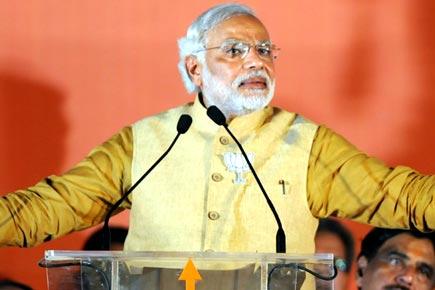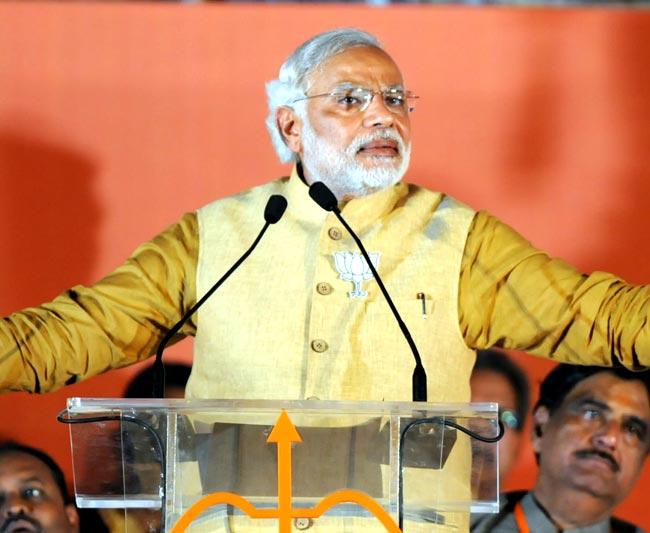Nearly 110 million people peacefully voted on Thursday in 117 Lok Sabha constituencies in 12 states in a staggered election that will see three more rounds to decide who gets to govern India the next five years

New Delhi: Nearly 110 million people peacefully voted Thursday in 117 Lok Sabha constituencies in 12 states in a staggered election that will see three more rounds to decide who gets to govern India the next five years.
ADVERTISEMENT

Narendra Modi
Some 60 percent of the 180 million electorate exercised their franchise in 201,735 centres to elect 117 MPs from 2,098 candidates, from political parties big and small as well as innumerable independents.
"Polling was largely peaceful barring a few stray incidents," Deputy Election Commissioner Alok Sinha told the media, after giving the extent of voting across the country. But as reports came in, it emerged that 11 polling staff and security personnel were killed in separate incidents in Assam, Jharkhand and Jammu and Kashmir.
Thursday's balloting marked the completion of voting in 349 of the 543 elected seats in the Lok Sabha. The remaining seats will see balloting on three days, the elaborate exercise ending May 12, four days before the results are declared.
There was low to massive polling Thursday. While only about 28 percent of the 1.3 million voted in Anantnag, a militant hub in the Kashmir Valley and the only constituency to vote in Jammu and Kashmir, over 80 percent of the 8.3 million turned up at polling booths in West Bengal.
Eight people - three polling staff and five policemen - were killed in Jharkhand's Dumka district Thursday when Maoists detonated a landmine as they were on their way back from a polling station, a police official said.
In Assam, a policeman was killed when a mob stoned a group of security personnel in Kokrajhar constituency, while in Jammu and Kashmir, a polling officer was killed and five others - two polling staff and three security personnel - injured in an attack by separatist guerrillas in Shopian district.
In Rajasthan, villagers clashed with security forces in Dausa and torched a government vehicle. Some reporters were also attacked and their camera equipment destroyed. A woman election officer died of heart failure in Thane, near Mumbai.
The enthusiasm to vote was palpable everywhere -- as it has been since the nationwide election began April 7. In Mumbai, India's financial and entertainment capital, leading industrialists and Bollywood stars stood along with commoners in queues to vote.
All 39 seats in Tamil Nadu and the lone seat in adjoining Puducherry voted Thursday. The Tamil Nadu verdict is critical for Chief Minister Jayalalithaa Jayaram, who has vowed to play a key role in government formation in the event of a hung parliament.
The states which went to the polls were Tamil Nadu (39 seats), Maharashtra (19), Uttar Pradesh (12), Madhya Pradesh (10), Chhattisgarh and Bihar (seven each), Assam and West Bengal (six each), Rajasthan (five), Jharkhand (four) and Jammu and Kashmir and Puducherry (one each).
Also Thursday, BJP's prime ministerial candidate Narendra Modi filed his nomination papers in Varanasi in Uttar Pradesh after a huge roadshow that turned the Hindu holy city into a sea of saffron as tens of thousands of his supporters took to the streets.
The show of strength dwarfed a similar roadshow when thousands marched with AAP leader Arvind Kejriwal when he filed his nomination for a high-profile Lok Sabha contest whose third main candidate is Ajay Rai of the Congress.
Striking an emotional chord, Modi tweeted that his "coming to Varanasi (to contest the election) is like a child going to his Mother. I have come to this divine land on the call of Ganga Mata... Thank you Varanasi. No words will describe the affection you have showered today".
He also promised to improve the lot of Varanasi's Muslim weavers, just as he said he had done wonders with the Muslim kite makers of Gujarat. His confidant Amit Shah, who was constantly by his side, said after Thursday "the Modi wave had turned into a Modi tsunami" in Uttar Pradesh which will destroy the Congress, the Samajwadi Party and the Bahujan Samaj Party.
Speaking in Guwahati after voting, Prime Minister Manmohan Singh said there was no "Modi wave" and that this was a pure creation of the media. He insisted that the Congress had not lost any ground.
 Subscribe today by clicking the link and stay updated with the latest news!" Click here!
Subscribe today by clicking the link and stay updated with the latest news!" Click here!






